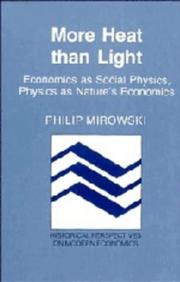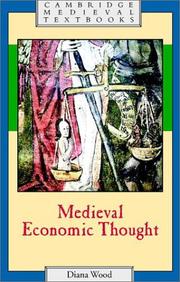| Listing 1 - 4 of 4 |
Sort by
|

ISBN: 0521350425 0521426898 110771267X 1107714567 0511559992 1107715911 1107720044 9781107720046 1107713056 9780511559990 9780521350426 9780521426893 Year: 1989 Publisher: Cambridge Cambridge University Press
Abstract | Keywords | Export | Availability | Bookmark
 Loading...
Loading...Choose an application
- Reference Manager
- EndNote
- RefWorks (Direct export to RefWorks)
More Heat Than Light is a history of how physics has drawn some inspiration from economics and also how economics has sought to emulate physics, especially with regard to the theory of value. It traces the development of the energy concept in Western physics and its subsequent effect upon the invention and promulgation of neoclassical economics. Any discussion of the standing of economics as a science must include the historical symbiosis between the two disciplines. Starting with the philosopher Emile Meyerson's discussion of the relationship between notions of invariance and causality in the history of science, the book surveys the history of conservation principles in the Western discussion of motion. Recourse to the metaphors of the economy are frequent in physics, and the concepts of value, motion, and body reinforced each other throughout the development of both disciplines, especially with regard to practices of mathematical formalisation. However, in economics subsequent misuse of conservation principles led to serious blunders in the mathematical formalisation of economic theory. The book attempts to provide the reader with sufficient background in the history of physics in order to appreciate its theses. The discussion is technically detailed and complex, and familiarity with calculus is required.
Business, Economy and Management --- Economics --- Physics --- 330.81 --- Natural philosophy --- Philosophy, Natural --- Physical sciences --- Dynamics --- Economic theory --- Political economy --- Social sciences --- Economic man --- 330.81 Voorlopers van Adam Smith. Mercantilisme. Colbertisme. Fysiocraten. Kameralisme --(economisch denken) --- Voorlopers van Adam Smith. Mercantilisme. Colbertisme. Fysiocraten. Kameralisme --(economisch denken) --- Methodology of economics --- Economic schools --- E-books --- Economics. --- Physics.
Book
ISBN: 9780521874731 0521874734 9780511781070 9780511933493 0511933495 0511853319 1107218780 0511925751 1282943790 9786612943799 0511928262 0511781075 0511932138 0511930798 Year: 2011 Publisher: Cambridge Cambridge University Press
Abstract | Keywords | Export | Availability | Bookmark
 Loading...
Loading...Choose an application
- Reference Manager
- EndNote
- RefWorks (Direct export to RefWorks)
Fossils are essential to the reconstruction of the evolution of life and episodes in Earth history. Knowledge of biomineralization - the processes associated with the formation of mineralized biological structures - is essential to properly evaluate data derived from fossils. This book emphasizes skeletal formation and fossilization in a geologic framework in order to understand evolution, relationships between fossil groups, and the use of biomineral materials as geochemical proxies for understanding ancient oceans and climates. The focus is on shells and skeletons of calcareous organisms, and the book explores the fine structures and mode of growth of the characteristic crystalline units, taking advantage of most recent physical methodological advances. The book is richly illustrated and will be of great interest to advanced students and researchers in paleontology, Earth history, evolution, sedimentology, geochemistry, and materials science.
Biomineralization. --- Fossilization. --- Fossilification --- Fossilisation --- Taphonomy --- Biological mineralization --- Mineralization, Biological --- Minerals in the body --- Biomineralization --- Fossilization --- 330.8 --- 330.81 --- 330.35 --- 330.35 Economische groei. Kwantitatieve toename. Technische vooruitgang --zie ook {338.09} --- Economische groei. Kwantitatieve toename. Technische vooruitgang --zie ook {338.09} --- 330.81 Voorlopers van Adam Smith. Mercantilisme. Colbertisme. Fysiocraten. Kameralisme --(economisch denken) --- Voorlopers van Adam Smith. Mercantilisme. Colbertisme. Fysiocraten. Kameralisme --(economisch denken) --- 330.8 Economisch denken. Economische scholen. Economische theorieen --- Economisch denken. Economische scholen. Economische theorieen

ISBN: 041513353X 0415867320 9786610110285 1134785305 1280110287 0203435974 0429231725 9780203435977 9781134785308 9780415133531 9781134785254 9781134785292 9780415867320 1134785291 Year: 1996 Volume: 12 Publisher: New York : Routledge,
Abstract | Keywords | Export | Availability | Bookmark
 Loading...
Loading...Choose an application
- Reference Manager
- EndNote
- RefWorks (Direct export to RefWorks)
Joseph A. Schumpeter was one of the great economists of the twentieth century. His History of Economic Analsyis is perhaps the greatest contribution to the history of economics, providing a magisterial account of the development of the subject from Ancient Greece to the mid-twentieth century. Schumpeter's views on his predecessors have proved to be a constant source of controversy. Here individual chapters examine such disparate questions as Schumpeter's apparent disregard for the American Institutionalists, his grudging respect for Adam Smith, the perspicacity of his views of Que
Schumpeter, Joseph A. --- Evolutionary economics --- Economists --- History. --- Schumpeter, Joseph Alois, --- 330.81 --- -Evolutionary economics --- -Economists --- -330.09 --- Economics --- Social scientists --- Voorlopers van Adam Smith. Mercantilisme. Colbertisme. Fysiocraten. Kameralisme --(economisch denken) --- History --- Schumpeter, Joseph Alois --- Schumpeter, J. A. --- Shumpeter, I. --- Shumpeter, Ĭ. --- Shumpeter, Iosif Aloiz, --- Shumpeter, Ĭozef, --- Shunpētā, --- 330.81 Voorlopers van Adam Smith. Mercantilisme. Colbertisme. Fysiocraten. Kameralisme --(economisch denken) --- 330.09 --- Schumpeter, Joseph A., --- Congresses --- United States --- Schumpeter, Joseph Alois, - 1883-1950. --- Evolutionary economics - History. --- Evolutionary economics - History --- Economists - United States --- Schumpeter, Joseph --- Schumpeter, Josef --- Schumpeter, J.A. --- シュンペーター, J.A.

ISBN: 0521458935 0521452600 0511116101 0511039441 0511148348 0511330294 0511811047 1280151803 0511052812 1107126584 9780511039447 9780521458931 9780521452601 9780511811043 Year: 2002 Volume: *4 Publisher: Cambridge Cambridge University Press
Abstract | Keywords | Export | Availability | Bookmark
 Loading...
Loading...Choose an application
- Reference Manager
- EndNote
- RefWorks (Direct export to RefWorks)
This book is an introduction to medieval economic thought, mainly from the twelfth to the fifteenth centuries, as it emerges from the works of academic theologians and lawyers and other sources - from Italian merchants' writings to vernacular poetry, Parliamentary legislation, and manorial court rolls. It raises a number of questions based on the Aristotelian idea of the mean, the balance and harmony underlying justice, as applied by medieval thinkers to the changing economy. How could private ownership of property be reconciled with God's gift of the earth to all in common? How could charity balance resources between rich and poor? What was money? What were the just price and the just wage? How was a balance to be achieved between lender and borrower and how did the idea of usury change to reflect this? The answers emerge from a wide variety of ecclesiastical and secular sources.
Economic schools --- Economics --- Economie politique --- History --- Histoire --- Aristotle. --- Aristotle --- Economics. --- Economic Theory --- Business & Economics --- 330.81 --- Voorlopers van Adam Smith. Mercantilisme. Colbertisme. Fysiocraten. Kameralisme --(economisch denken) --- Arts and Humanities --- 330.81 Voorlopers van Adam Smith. Mercantilisme. Colbertisme. Fysiocraten. Kameralisme --(economisch denken) --- Aristoteles --- Aristote --- Aristotile --- Contributions in economics. --- Arisṭāṭṭil --- Aristo, --- Aristotel --- Aristotele --- Aristóteles, --- Aristòtil --- Arisṭū --- Arisṭūṭālīs --- Arisutoteresu --- Arystoteles --- Ya-li-shih-to-te --- Ya-li-ssu-to-te --- Yalishiduode --- Yalisiduode --- Ἀριστοτέλης --- Αριστοτέλης --- Аристотел --- ארסטו --- אריםטו --- אריסטו --- אריסטוטלס --- אריסטוטלוס --- אריסטוטליס --- أرسطاطاليس --- أرسططاليس --- أرسطو --- أرسطوطالس --- أرسطوطاليس --- ابن رشد --- اريسطو --- Pseudo Aristotele --- Pseudo-Aristotle --- アリストテレス --- Economics - History - To 1800. --- Influence
| Listing 1 - 4 of 4 |
Sort by
|

 Search
Search Feedback
Feedback About UniCat
About UniCat  Help
Help News
News